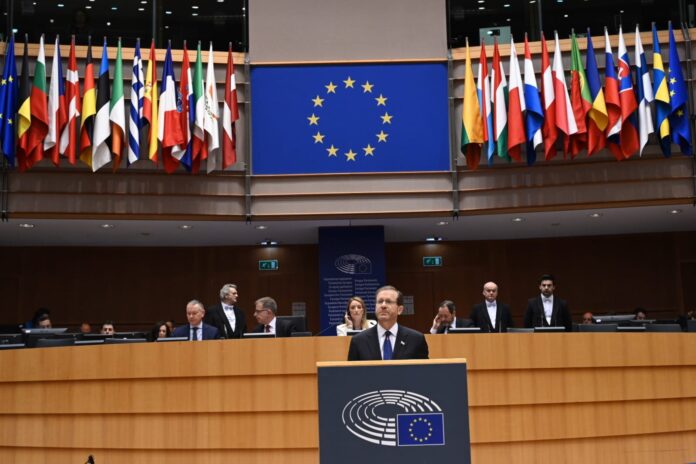
Yad Vashem Chairman Dani Dayan and United Nations Secretary General António Guterres unveiled the ‘Book of Names of Holocaust Victims’ at UN Headquarters in New York.
The exhibition was part of activities of the United Nations Outreach Programme to mark International Holocaust Memorial Day.
The installation features the names of 4,800,000 Holocaust victims in Yad Vashem’s database of Shoah Victims’ Names. The length of the Book of Names is eight meters. A strip of light runs the length illuminating the memory of Jewish men, women children murdered during the Holocaust.
Blank pages at the end symbolise over a million people to be recovered.
In his UN address, Dayan recalled his great-uncles Nahman and Arieh murdered during the Shoah. He spoke of a “deeply moving experience” when he found lost relatives and friends in the book.
“Tragically we cannot revive even one of the millions that they murdered, but we can, and do, restore their names and stories,” he said. “We do this because the victims deserve no less.”
“History never repeats itself exactly, but the phenomena of extreme antisemitism and other racial hatreds, aggressive violence and corrupt dictatorships are recurring. To combat and overcome them, we can and must learn from the Shoah. And we start that by faithfully and accurately remembering its victims. That is why the Book of Names is here now.”
“The six million Jewish men, women and children are lost forever but their memories and their names will never be forgotten,” said UN Secretary General Guterres. “This exhibition is a call to action. It is a call to remembrance, as fewer and fewer can be direct witnesses, and we will have to find a way to carry the Torch of Remembrance forward.”
The installation will be brought to Israel to be permanently included in Yad Vashem’s Museum’s Complex. It will be open to public viewing for Israel’s Yom Hashoah on 17-18 April.
Yad Vashem’s ready2print exhibition ‘Shoah: How was it Humanly Possible?’ was unveiled at the European Parliament in Brussels by President Isaac Herzog who presented President Roberta Metsola with a copy of ‘The Refugee’ from Yad Vashem’s Art Collection.
The artwork was created by German Jewish artist and Holocaust victim Felix Nussbaum when he was in hiding in 1939.
Prime Minister Benjamin Netanyahu led commemorations from Israel.
He said: “Israel protects itself by itself. We have built up a powerful state that will not allow our enemies to inflict the very pain, suffering and devastating loss our people experienced during the Holocaust.” He added: “If needed, we can and will defend ourselves, we will not allow our enemies to possess an ability to carry out its murderous agenda. We do not forget or forgive the evil deniers of the Holocaust, which for them, one Holocaust was not enough. I vow to you as Prime Minister of the one and only Jewish state, that we will remain vigilant, strong and never allow the Holocaust to happen again.”
Yad Vashem, meantime, hosted its annual symposium for international diplomatic corps.
The event featured lectures. The Central Theme was ‘Jewish Resistance during the Holocaust: 80 Years since the Warsaw Ghetto Uprising’.
Minister of Education Yoav Kish delivered a keynote address. Zambian Ambassador Martin Mwanambala spoke and Dayan gave an address by video link.
In Brussels, Herzog addressed the European Parliament and recalled how his father, Israel’s Sixth President, Chaim Herzog, was a British Army officer and one of the first liberators of Bergen-Belsen.
“Millions of worlds, one third of the Jewish people were wiped out in the killing pits, in the gas chambers, in the furnaces, in the death camps,” he said.
Herzog noted that Jew-hatred was as “old as time itself” and warned about rising antisemitism.
He observed: “Jew-hatred still exists. Antisemitism still exists. Holocaust denial still exists. The latest reports point to new records of hatred as antisemitism continues to don new guises.
“Viral antisemitism is spreading at a record pace. Antisemites draw inspiration from virtual platforms. They are brainwashed and enraged as a result of unchecked and unrestrained online discourse.”
Herzog called on elected officials of Europe to read the warning signs, detect the “symptoms of the pandemic of antisemitism” and fight it at all costs.
“You must ensure that every Jew wanting to live a full Jewish life in your countries may do so safely,” he said. “Use every tool at your disposal from education and legislation to security and enforcement, to deter and eradicate hatred, racism and antisemitism in all their forms. You must instil the understanding across Europe that the Jewish people’s right to national and sovereign self-determination is sacred, and manifested in our democratic state, the State of Israel. “
Herzog called on members to fully adopt the International Holocaust Remembrance Alliance definition of antisemitism.
He added: “Criticism of the State of Israel must not cross the line into negation of the very existence of the State of Israel. The rule is simple, criticism of us must pass the basic test of fairness and integrity and it must not cross the line into dehumanisation or delegitimisation.
“The State of Israel rose like a phoenix out of the ashes and the terrible destruction and realised our historic right to a state in our ancient homeland.”
Herzog welcomed alliances with European states and institutions of the European Union.
He said: “Our shared interests and values dictate our present and shape our future. Liberty, equality, justice and peace, these are the fundamental values enshrined in the Declaration of Independence of the State of Israel, which we shall uphold and defend at any cost. These are also the core values of the European Union.”
Herzog added: “We must work together as a single community, determined and cohesive, against the forces of darkness and hatred that threaten to destroy us.









